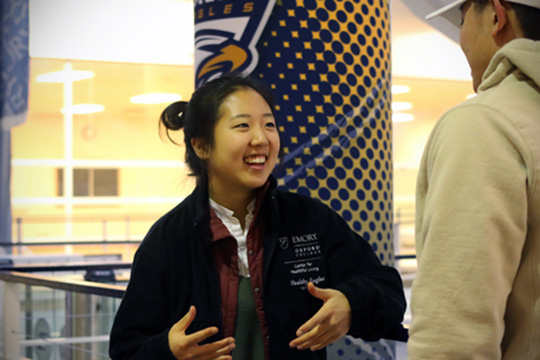
January 18, 2018
By S.A. Reid, Contributing Writer, Emory Campus Life
Emory Campus Life’s Department of Recreation and Wellness is looking for a few good student recruits at the Atlanta campus for its new Healthy Eagles Ambassadors Program.
Their special mission: Help create a culture of wellness by linking their peers to existing resources on Emory’s Atlanta campus and new programs and services imagined and driven by students. Healthy Eagles Ambassadors will serve as student advocates for the initiative, which embraces a holistic approach to wellness, with programming on topics that range from nutrition to stress management.
Program officials plan to select and train 15 to 20 ambassadors in the coming months to prepare for the pilot program’s spring launch. Undergraduate and graduate students are encouraged to apply via Handshake, a campus jobs portal, or via the department’s website.
“One of the biggest things we’re looking for is students who are already connectors on campus and have a passion for health and wellness,” says April Flint, director of Recreation and Wellness. “We’re looking for students who want to help their peers to become well and to excel.”
The initiative, under development since last summer, is an outgrowth of the Healthy Emory Strategic Plan, a university-wide effort to improve
Recreation and Wellness staff studied programs at a number of Emory’s peer and other institutions in developing a version for the Atlanta campus that will be significantly more student-focused than what’s typical at other schools.
“We want this to be organically created by the ambassadors,” Flint adds. “We’re assembling this student group so that their impact and opinions matter more than ours.”
Peer-to-peer outreach is the most effective way, she says, to fill the knowledge gap regarding the department’s program and service offerings.
“We’ve heard pretty consistently from students that they don’t know what resources are available or if they do, they don’t know how to connect with them,” Flint explains. “Students don’t want to listen to staff; they
 Kim discusses the Healthy Eagles Ambassadors program with Deion Huang, a sophomore psychology major. Huang was a program participant at Oxford College and is considering serving as an ambassador on the Atlanta Campus. Photo credit: Tina Chang
Kim discusses the Healthy Eagles Ambassadors program with Deion Huang, a sophomore psychology major. Huang was a program participant at Oxford College and is considering serving as an ambassador on the Atlanta Campus. Photo credit: Tina Chang
According to Aaron High, fitness and wellness coordinator and point person for the initiative, the concept for the Healthy Eagles program is a product of the Healthy Emory Strategic Plan. The decision to implement the program was made after the department’s student wellness team completed a successful year of wellness programming.
“Healthy Eagles Ambassadors is a natural evolution from that experience,” says High. “The idea is for ambassadors to serve as resource connectors, people who can champion Healthy Emory’s goal of creating healthier communities.”
Maya Coe, a junior human health major, says she was unaware of what Recreation and Wellness had to offer until she joined the department as a student worker.
“The program is another marketing effort to get the word out,” adds Coe, who helped design the volunteer application and brainstorm ways to better communicate the department’s offerings to the Atlanta campus. “Healthy Eagles Ambassadors enable peer-to-peer communication.”
The Atlanta effort mirrors a similar but separate Healthy Eagles peer-educator program underway at Emory’s Oxford College since 2011. It got its start as a data-driven response to specific health and wellness concerns of underclassmen on that campus, according to Amanda Yu-Nguyen, Center for Healthful Living director at Oxford. Stress reduction and wellness-promoting activities emerged as priorities in national health studies and campus-specific surveys.
Every year, the Oxford program selects and trains about a dozen sophomores to develop fun and educational ways to connect students to wellness-related information and resources. These peer educators collectively establish programmatic priorities and goals annually based on their interests and student needs.
Stress relief is a major focus. Healthy Eagles’ signature Tea Tuesdays at Oxford are opportunities for students to relax as they sip on loose-leaf tea they brewed themselves. These and other stress-buster events offer a much-needed break during finals.
About half of the center’s 36 health-related programs last year were Healthy Eagles sponsored or led, according to Yu-Nguyen, who praised the Atlanta campus for tapping into the peer-to-peer information pipeline.
“Students well-armed with correct information about campus resources will make both campuses healthier as a whole,” she says. Serving in this role, Yu-Nguyen suggests, can be as beneficial to peer educators or ambassadors as it is to the students they sign up to help.
An example is Sally Kim, a peer educator
“It’s been really great because I get to be involved and learn more about wellness,” says Kim. “It has helped out a lot in my own life, and I’m given the opportunity to be a role model for other students on campus.”
Learn more about this volunteer opportunity on the Atlanta Campus or complete an application
Learn more about the Healthy Eagles Program at Oxford